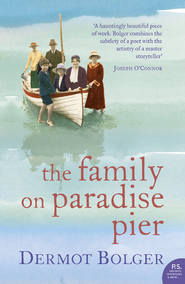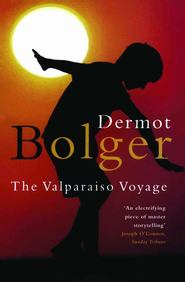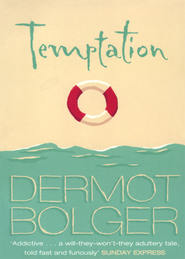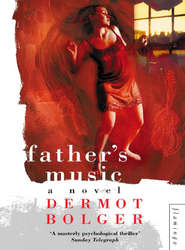По всем вопросам обращайтесь на: info@litportal.ru
(©) 2003-2024.
✖
The Woman’s Daughter
Настройки чтения
Размер шрифта
Высота строк
Поля
I suppose Johnny was always just weak, although I never recognized it then. A few years later on I remember catching a glimpse of him one night in the National Ballroom in town. We had gone off to see the Clipper Carlton Showband but couldn’t get in, so we’d wound up there without him knowing it. I was standing up near the stage to gaze at the Mighty Avons when I saw him hovering in front of a girl with a stiff beehive, trying to work up the courage to ask her to dance.
He was so slow and obviously nervous that her friends began to giggle in the chairs beside her and she became embarrassed. Then he asked her in a rush and seemed almost relieved when she snubbed him and he could merge back into the crowd as if it had been the high point of his night.
But back when I was eleven or twelve he was a hero because, even though he was bigger, he never looked down on me and I felt important and wanted in his company. Besides, I was at an age to want to know and there was nobody else to tell me things. Poor Johnny, always laughing and joking when we were alone, and then quiet in company like you’d think he was in bad humour till you realized he lacked a single shred of confidence. Always tucked up in the centre of a crowd of lads as if living off their collective bravado. For all his air of knowledge I suppose he knew as little as I did in those days.
Stillness reigns when the key is turned in the lock. The woman’s footsteps turn to descend the stairs, pausing every morning to listen for sounds before the glass rattles in the panel of the front door as it is slammed shut. The noise reverberates through the floorboards up into the dark room where the girl lies, and all the glass there seems to take up the echo and quiver until the very air is vibrating with sound. She never moves from the mattress, but beneath her closed eyelids she can feel the roof descend. Walls advance and begin to spin as the bed springs undulate like a rippling tide. Breathless with excitement, she waits for her friend to visit her.
He calls her name through clanging coat-hangers, there is no danger – she can answer him. He is both older and younger than her. He has no age. He has lived forever. He tears apart all the colours that form black; dissolving reds and blues spin in glowing bands around the room. Nothing there is stationary any longer, he breathes his life into the woodwormed furniture. And nobody can reach her inside that cocoon, she is deaf to the shouts of children playing outside. She never has to warn him when to leave, johnny johnny knows when his time is done. He knows that he can never be forgiven, he knows he must remain her secret lover. Slowly he gathers himself up, softly the bed springs are reined in. Only darkness remains in the room when the girl’s eyes flicker open and the woman’s footsteps come.
After tea one evening I began to get cramps as I was washing up. It was like a dull sharp pain that would never end. I climbed up to this room and lay on the bed frightened to call for help. When I ran my hand gingerly up along the inside of my dress my fingers were smeared with blood. I was sure it was the consequence of the deeds I had committed with Johnny, our secret finally being made public.
The blood seeped out until I thought I was about to die. Johnny came into the room looking for something and stood staring at the stains of blood where my hand touched the coverlet. I wouldn’t let him touch me or tell him what was wrong, so he shouted down to my father who fidgeted awkwardly at the foot of the bed. Embarrassed, he pushed Johnny out of the room, told me to lie still and left me alone.
For ten minutes I waited, listening to the stillness of the house and then Mrs Whelan arrived, still in her nurse’s uniform, and took my hand. She cleaned me up and dried my tears, and sat beside my bed for two hours talking and teaching me the names of things.
‘I’m only around the corner from you, Sandra,’ she said, ‘you know if you are ever worried you can come to me.’ For a moment I almost told her everything and then I stopped, afraid to lose her esteem.
‘I’ll be okay, thank you,’ was all I said, and she smiled back as she left the room. Johnny came up when she was gone and began to take spare blankets from inside the wardrobe. He said Daddy had told him to sleep on the sitting-room sofa until he had time to buy a single bed for downstairs. He paused as he told me and stood at the door with the pile of bedclothes in his arms. I know he wanted to say something but for the first time in our lives there seemed nothing more to say. I turned on my side away from him and heard him click out the light and reluctantly close the door of this room on himself.
Without him the bed was empty and huge. Alone for the first time in its depths I listened to the footsteps on the pavement outside and this time I knew where they were all going as if the innocence of my childhood had been washed away now that I was a grown-up woman of thirteen.
Stately as an ancient courtier, the retarded man with the stick bids her enter the peeling gates. Every Sunday afternoon since she was a child he has stood sentry at the entrance to the lane between the church and the school. This is where she comes to be alone on the Sabbath when all the shops in the village are closed. Nobody lives on the main street any more, the car-park of the vast, guarded shopping centre covers the site of the last few cottages and the post office. Graffiti on the high walls of the lane proclaim Bob Marley’s immortality, lovers pledge themselves with aerospray cans and illicit armies canvass support. She turns to watch him run his stick against the bars of the gate and behind him sees the figure of Turlough approaching.
The gaunt old man stares at her like the guardian of her childhood. She feels safe when he watches her as if somehow Turlough knew every secret of her life and yet did not condemn. The weekends are the worst for loneliness, the deserted main street, the empty playground beyond the wall, all reinforce her isolation. Only the lonely, withered figure of Turlough, who never speaks, seems to recognize her, seems to tell her that she is not alone in her story, that she is part of something greater, that there are others as abandoned as her.
For some reason his eyes always bring her solace as they stare at each other, while the shambling retarded figure between them smiles as he twirls his stick against the bars, lost inside his private nightmare.
Won’t you even move a little closer to me? Rise up from the floor and get back into bed? I could make you cosy if you only tried. Remember I’m your mother, I want to look after you. Will I tell you the first joke I ever heard?
‘Will I tell you a joke – a bar of soap! Will I tell you another – a pound of sugar!’
I suppose they’re silly, but we used to laugh at them when we were small. Do you know what I’ll tell you? I’ll tell you my first job, you’ll like that.
We were the biggest class in school and that summer we had to sit our primary exam. We never raced around the playground like the smaller girls now, we huddled together in the open shed laughing at jokes we were afraid to show we didn’t understand. One girl kept watch to see who the boys, pressing themselves against the wire and wolf-whistling, were staring at, while the rest of us pretended to ignore them.
The McCormack twins always smelt offish because they were already helping their mother who worked an evening shift at the processing plant. We’d tell each other the jobs we all wanted to get and sympathize with the two girls whose parents had the money to put them into secondary school.
On the last day the Head Nun came down the steps into the cellar to make a speech. She called us a credit to the school and hoped that what we had learnt would always stand us in good stead. There was a wide world beyond this classroom and though we would not notice the years flying till we had children of our own, whether here or in England, we’d still always be her little girls.
We gave three cheers for the nun and three cheers for Miss O’Flynn, and presented her with a box of milk chocolates that she shared out amongst us. The nun led us in a final prayer and reminded us that faith was the most precious gift we would ever receive before opening the door for us to file out into the summer light.
For the last time I walked up those steps with Kitty Murphy, our arms entwined, and we imagined ourselves in just a few years standing at the gates of this very school, leading our own children down to enrol, and how we’d laugh about old times with the familiar figures smiling in their black hoods. We paused at the corner to embrace and moved off like blood sisters with the wetness of her tears mingling into my own as they rolled slowly down my cheeks.
The smell of lacquer always clung to her clothes and hands even though she scrubbed them for hours each night. In the hot stifled atmosphere of the salon she brushes up the piles of shorn hair from the floor to be packed into boxes and sold to wig manufacturers. She trains her hand to be steady as she pours the cheap lotions into expensive jars for resale, and her feet ache as she runs from chair to chair, setting out clean towels and combs while the customers gaze at magazines from beneath the whirling dryers.
Autumn sunlight flashes against the windows of the buses in the street below the cramped rooms where meekly she obeys the commands of every member of the staff who, on her one half-hour break in the day, introduce her to the alien taste of coffee and allow her to marvel at the colour pictures in the pile of English women’s magazines.
Of course, I gave my wages every week to Daddy and from it he’d give me pocket money. In the evenings after work I could go walking in the street because I was free from homework. The films in the Casino were now becoming over-sixteens and I loved to watch the couples queuing there for the evening show.
It was only a matter of time before a boy would come along and at first, I’d be coy but finally I’d agree. He’d pay us into the 2/6d seats where I would let him take my hand, and afterwards he’d offer to walk me home and we’d take the dark side of the main road, over beside the stream and the trees on the bank, and he’d hold me against a trunk to press his lips on to mine.
After a few minutes I’d protest and he would stand back to apologize. I would give him my hand as we’d step again on to the path and when he left me at the gate, I would rush into the dark sitting-room to watch him standing across the street maintaining a lonely vigil beneath the lamp-post.
I’d go to bed, and all those memories of Johnny would be banished as I’d fall asleep dreaming of that young man out there waiting for me. But no boy ever asked and I’d never have been allowed to be seen on the street in such company. The door would be locked on me at nine o’clock and no amount of pleading would get me back in.
Acne and bristles and cigarettes. Johnny rarely stays at home now. Each evening he merges into a gang of mates, shouting from the open platforms of dark green buses. In the Astor, they wolf-whistle Brigitte Bardot in A Very Private Affair. In the Bohemian, Rock Around the Clock is being revived. They spend hours sharpening the tips of steel combs to rip out the seats during the theme song.
In the twisting streets around Stonybatter, small pubs welcome the scrum of under-age boys. At weekends they spend most of their wages there and queue in the greasy fish and chip shops of Phibsborough before strutting the two miles out by the cemetery with catcalls at the couples walking home from dances. They piss in front gardens, ring doorbells and empty dustbins along the main road. She hears him come in at two o’clock in the morning and waits for the light switch to click off in her father’s room.
On Friday nights, voices are raised in the kitchen as he demands Johnny’s wage packet, and when Johnny has stormed out, slamming the front door, her father comes in to her with his face white in the first shock of defeat. They sit in the chairs on both sides of the fire with only the flames and the red lamp in the corner to light the room, and listen to the voices on Radio Eireann, the farming reports, and whine of accordions and asthmatic tin whistles in strict and monotonous three-four time filling up the silent room.
They let me go in the hairdressing salon after the six months when they had promised to make me permanent. I stayed at home for two days while Daddy made enquiries. On the third night, he told me to report the next morning to the drapery shop in the village.
I was six months there behind a counter piled with patterns and balls of wool, when a letter came in my name calling me for interview to the new shirt factory below the village. He had never told me he had even applied. I was taken on with a hundred and twenty others.
The plant was brand new, everything so spick and span, and there were loads of girls just turned fifteen like myself. They let us play the radio all day as we sat at the machines and the older women came round with baskets to collect the finished garments. The Beatles were coming to Dublin and there was such excitement in work you couldn’t imagine. Two of the girls had tickets and walked around like queens, while the rest of us arranged to meet up and stand outside the Adelphi to try and catch a glimpse of them.
There were thousands there, pushing and milling, and then as the first show came out, the fighting began. The girls behind me started pulling my hair to get up nearer and the police charged down Abbey Street after the gangs of boys. I fell in the crush and cut my knee open. A policeman pushed the people back and lifted me out as I put my arms around his neck and clung to him in terror. They brought me home in a squad car, crammed with other girls who’d been hurt.
All the way home I prayed Daddy would be out, but he came to the door when the car pulled up. He looked so slight and feeble there with shame in his eyes as if the world was slipping away from him. He grabbed me by the hair in the garden and pulled me inside until he was pressed right up against me in the hallway. I could feel his breath as he raised his hand and I cowered, waiting for the slap to come down across my face. Instead, he just lowered it again and shook his head.
‘I’ll lock you in that room upstairs,’ he said, ‘till you learn not to disgrace me.’ And he grabbed hold of my coat and pushed me ahead of him up the stairs. I was sobbing and tried to put my arms round him but he just shoved me on to the bed in this room and unscrewed the light bulb. He locked the door and left me sitting in the darkness. It was a Friday evening. From the window I could see the young people coming home from the pictures in groups, singing and enjoying the last drags of cigarettes before they reached their houses. And later on, the couples from the dances, on scooters or on foot, quiet now and anxious to avoid notice, standing against the dark leaves of the bushes fronting Mrs Finnegan’s house with their arms around each other and only their mouths moving.
Johnny came in and I waited, hearing him ask where I was. I could hear their voices raised in argument, followed by the sitting-room door slamming. Then my father’s feet came, one step, two step, like the old bogeyman. Was he coming to forgive me? Was he coming with his belt to beat me? The steps went into his bedroom and I heard the door close. There was complete silence in the house, yet I knew none of us were asleep. All night I kept waiting for Johnny to come. I’d say to myself, he’s waiting for Daddy to cool down, in another ten minutes he’ll climb the stairs. Or he’s searching in the kitchen for the spare key, any minute now he’ll come for me.
The darkness in the room was unbearable because I could not control it. I kept on imagining all kinds of things; my mother was sitting by the door in a chair, the furniture was swaying in the dark around me, floorboards were creaking on the landing. But nothing happened and nobody came, until finally towards dawn I fell asleep from exhaustion.
‘I’ll dream of them tonight,’ said the small, fat fifteen-year-old girl whose eyes were shining and forehead damp as she tottered out into O’Connell Street like somebody possessed.
There was a tiny man with a red nose and spectacles standing on a wooden box outside the Evening Press offices preaching about salvation. But he was talking to himself. Outside the cinema, a rowof stout policemen with their arms linked were heaving strenuously against a frantic sea of young people. Girls were screaming inside. They screamed at the pictures in the programmes or if somebody shouted ‘Beatles!’ The atmosphere was hot and sharp: full of power and perfume and a frightening excitement.
But when the curtain finally rose on THEM, the house erupted into one mad, thunderous noise, that continued right until the cries for more were drowned by the National Anthem.
This morning it was ‘B’-Day plus one as the city began to clean up the debris from the Beatles invasion. Motorists made their way through the shambles of Abbey Street, while workers replaced the plate glass windows which fell victim to teenage hysteria.
Trouble began after the first of the two shows when more than two thousand people leaving the cinema ‘mingled’ with those going in. Members of the St John Ambulance Brigade attended to injured people on the spot while crowds ran riot around them.
Said a Garda sergeant whose cap was knocked off by a flying object, ‘I have seen everything now. This is really mad. What can have got into them? You would imagine the country was in the middle of a revolution instead of welcoming four fugitives from a barber’s shop.’
On the Saturday morning I knocked, but Johnny had gone away to town. I could hear Daddy in the room below silently pacing. I kept crying out for food and water until he finally appeared. He left the tea and sandwiches on the dresser and never once spoke. I wished to God he would scream at me or beat me black and blue, but he punished me instead with his silence.
I had had to pee in an old vase of my mother’s that I was afraid to show him. By seven o’clock every muscle of my body was tense, my nails were bitten through, my head was drumming. I felt like the man in the paper who had been buried alive. I began to shriek like an animal and hurl myself against the door and that is where Johnny discovered me.
This is the bit the girl knows by heart. Where Johnny discovered me. These are the words she will say to herself in the long afternoons when the woman is working. Sitting in the chair watching over the bed where her nightdress is stretched on top of the sheets. She leans her head forward every time the story reaches here and gazes at the woman’s lips.
Johnny came home at nine o’clock and when my father wouldn’t give him the key, he went upstairs and kicked the door in. He found me lying in a pool of urine with blood crusted on my forehead. He carried me into the bathroom and locked the door, then filled the tub and sponged me down. I remember that his hands moved with a gentleness I had not thought him capable of. It was the first time he’d touched me in over two years.
He pulled a clean nightdress over my head and laid me back gently in my bed. Though I was groggy and only half-aware, I could feel a tremor in his hands as he drew the blankets over me and whispered, ‘Don’t worry, sis, I’ll look after you. I’ll never leave you alone with him again.’










